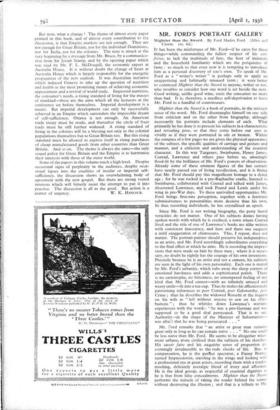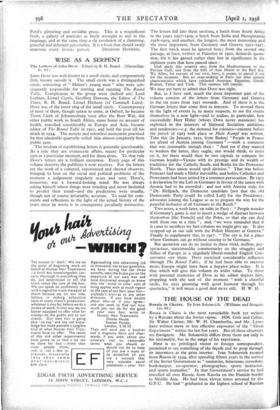MR. FORD'S PORTRAIT GALLERY
IT has been the misfortune of Mr. Ford—if he cares for these things—while commanding the fullest respect of his con- freres, to lack the multitude of fans, the host of imitators and the household familiarity which are the perquisites of fame : so much so that even now it is tempting to introduce him as a personal discovery of one's own. To speak of Mr. Ford as a " writer's writer " is perhaps only to apply an unappetising and habitually misused term ; it were better to commend Mightier than the Sword to anyone, writer or not, who troubles to consider how one word is set beside the next. Good writing, unlike good wine, costs the consumer no more than bad. It is, therefore, a needless self-deprivation to leave Mr. Ford to a handful of connoisseurs.
Mightier than the Sword is a book of portraits, in the strictest sense of the word. Mr. Ford disentangles himself on one side from criticism and on the other from biography, although necessarily his portraits include elements of each. What primarily he has done is to present his subjects in a characteristic and revealing pose, so that they come before our eyes as vividly as if they were portrayed in oils or bronze. Within the compass of a few pages we are given the physical appearance of the subject, the specific qualities of carriage and gesture and manner, and a criticism and understanding of the essential character. In this way Turgenev, Swinburne, Henry James, Conrad, Lawrence and others pass before us, amazingly flood-lit by the brilliance of Mr. Ford's powers of observation. Already some of these eminent figures of the last century have nearly passed out of living recollection, and it is fitting that Mr. Ford should pay this magnificent homage to a dying age ; for he was rocked in a pre-Raphaelite cradle, listened to Swinburne, collaborated with Conrad and talked with James, discovered Lawrence, and took Pound and Lewis under his wing in pre-War days. To these unrivalled opportunities Mr. Ford brings first-rate perception, together with a feminine submissiveness to personalities more decisive than his own. In thus recording individuals, he has crystallised an epoch.
Since Mr. Ford is not writing biography, the petty literal veracities do not matter. One of his subjects denies having spoken words with which he is credited, a town where Conrad lived and the title of one of Lawrence's books are alike written with consistent inaccuracy, and here and there one suspects a mild exaggeration of chiaroscuro. This, I repeat, does not matter. The portrait-painter should preserve his independence as an artist, and Mr. Ford accordingly subordinates everything to the final effect at which he aims. He is recording the impres- sions that were made on him by these men ; where it is neces- sary, no doubt he rightly has the courage of his own inventions. Precisely because he is an artist and not a camera, his subjects are seen in the light of his own personality. Each one is muted by Mr. Ford's urbanity, which rubs away the sharp corners of emotional harshness and adds a sophisticated polish. There is no catastrophe, no bitterness, no untempered feeling of any kind that Mr. Ford cannot—with an infinitely amused and weary smile—fit into a tea-cup. Thus he makes his affectionately patronising references to poor Conrad, poor Galsworthy, poor Crane ; thus he describes the widowed Rossetti at the inquest on his wife as " left without anyone to sew on his shirt- buttons " ; thus he whittles down Lawrence's wartime experiences with the words : " he was a pro-German and was supposed to - be a good deal persecuted. That is to say, Authority--in the shape of the Minister of Information— was afrai.1 that he was being persecuted . . . "
Mr. Ford remarks that " an artist or great man remains great only as long as he can remain naive . . . " No one could be less naive than Mr. Ford. He seems to be altogether wiser. more urbane, more civilised than the subjects of his sketches. His savoir faire and his exquisite sense of proportion arc seemingly invulnerable to the rude shocks of life. But, in compensation, he is the perfEct spectator, a Fanny Burney turned Impressionist, standing in the wings and looking with a professional eye at great actors, recording them with a tender. mocking, delicately nostalgic blend of irony and affection. He is the ideal gossip, as respectful of essential dignities as he is free from false concealments. Mightier than the Sword performs the miracle of taking the reader behind the scenes without destroying the illusion ; and that is a tribute to Mr.
Ford's glittering and enviable prose. This is a magnificent book, a gallery of portraits as finely wrought as any in the language, and at the same time a sly revelation of,a charming, graceful and debonair personality. It is a book that should vastly
entertain every literate person. DESMOND HAWKINS.















































 Previous page
Previous page